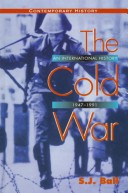Contemporary History
1 total work
This study provides a fresh assessment of the entire course of the Cold War based on insights into the structure of post-war politics revealed by the collapse of the Soviet Union. It draws on newly-released material and scholarly research from both the West and from former Communist states. The authors argue that the Cold War can only be understood by exploring the interplay between ideology, domestic politics and military security, not only in the United States and the Soviet Union, but in other countries with a capacity for significant military and political action. The book ranges from Europe to Asia and Latin America, examining the Cold War policies of the key powers from their own perspective. Finally, it examines long-term trends; it explores the initial dynamism of national Communism and the reasons for its eventual decay as a force in international politics. It also suggests why the USA's long-term global strategy, first developed in the 1950s, brought it disaster in the 1960s, but also eventual victory over the Soviet Union.
